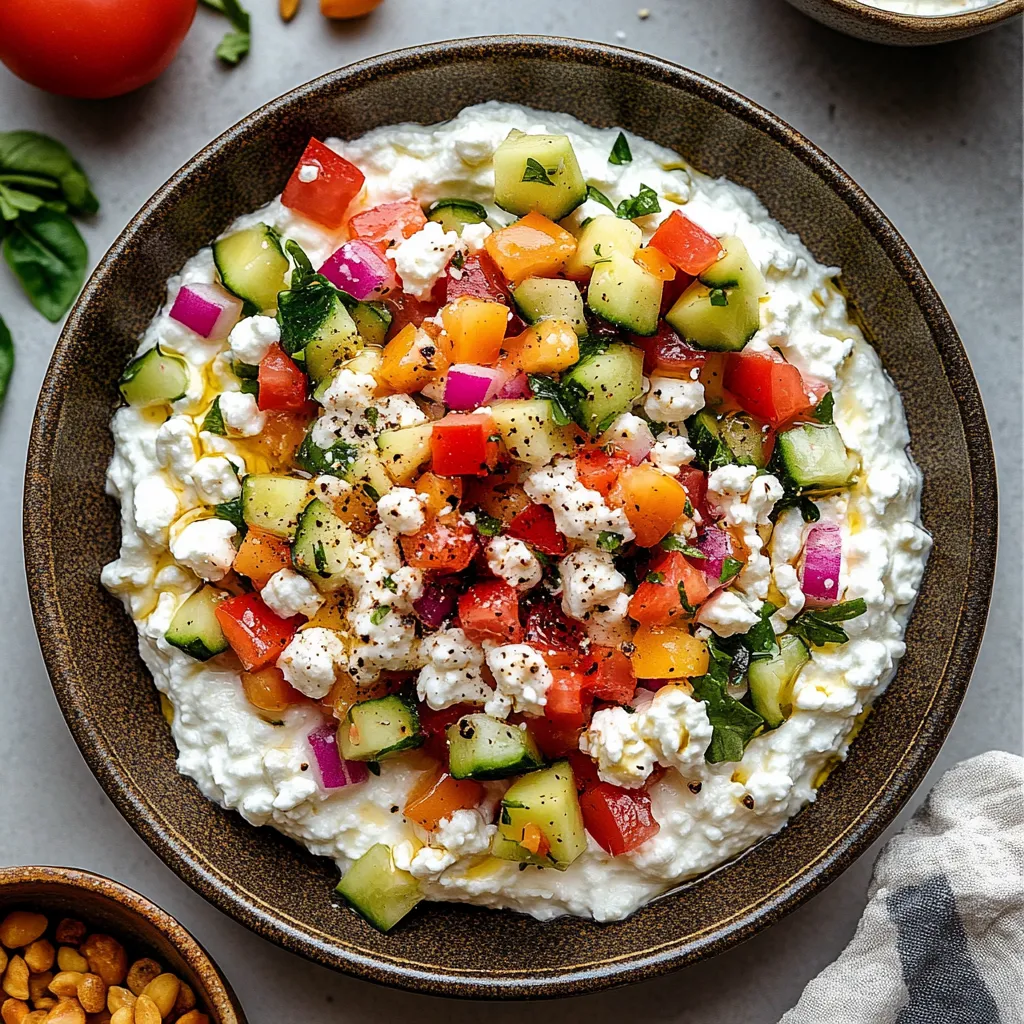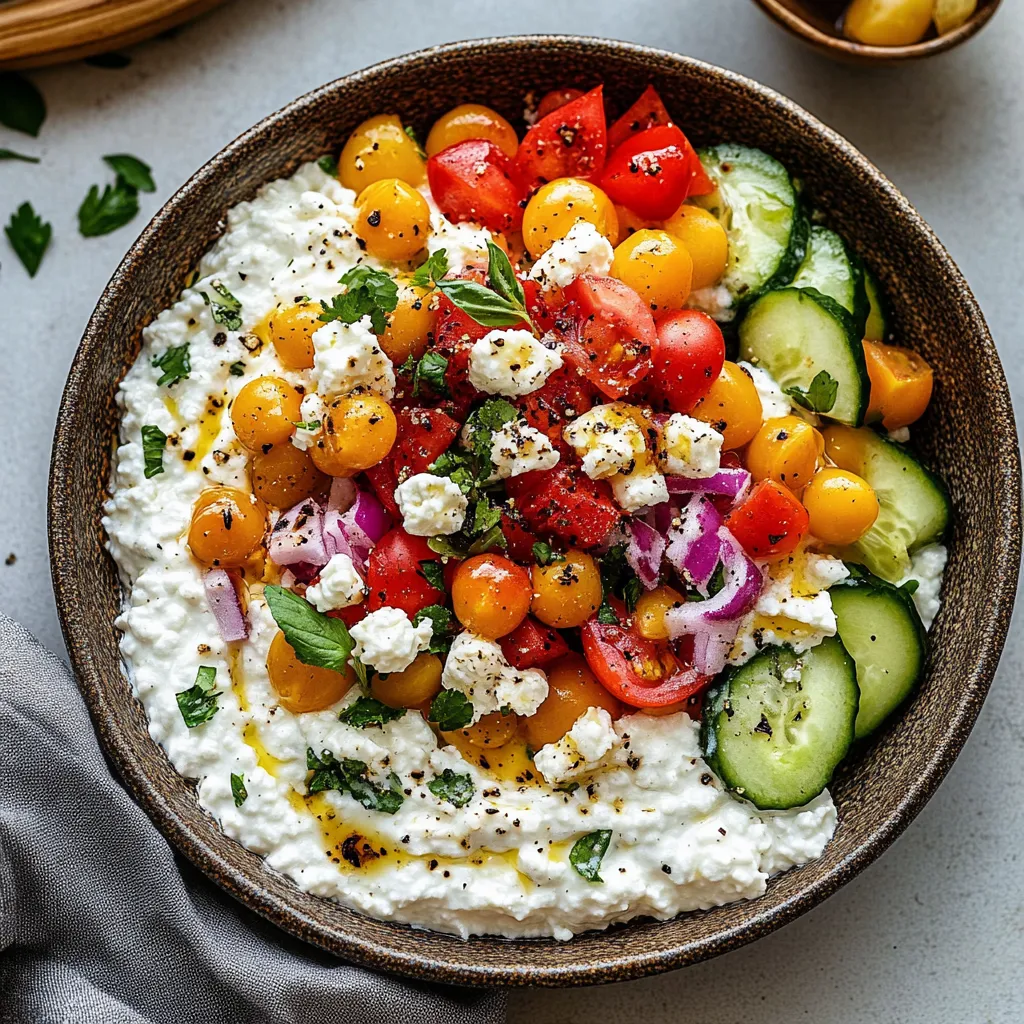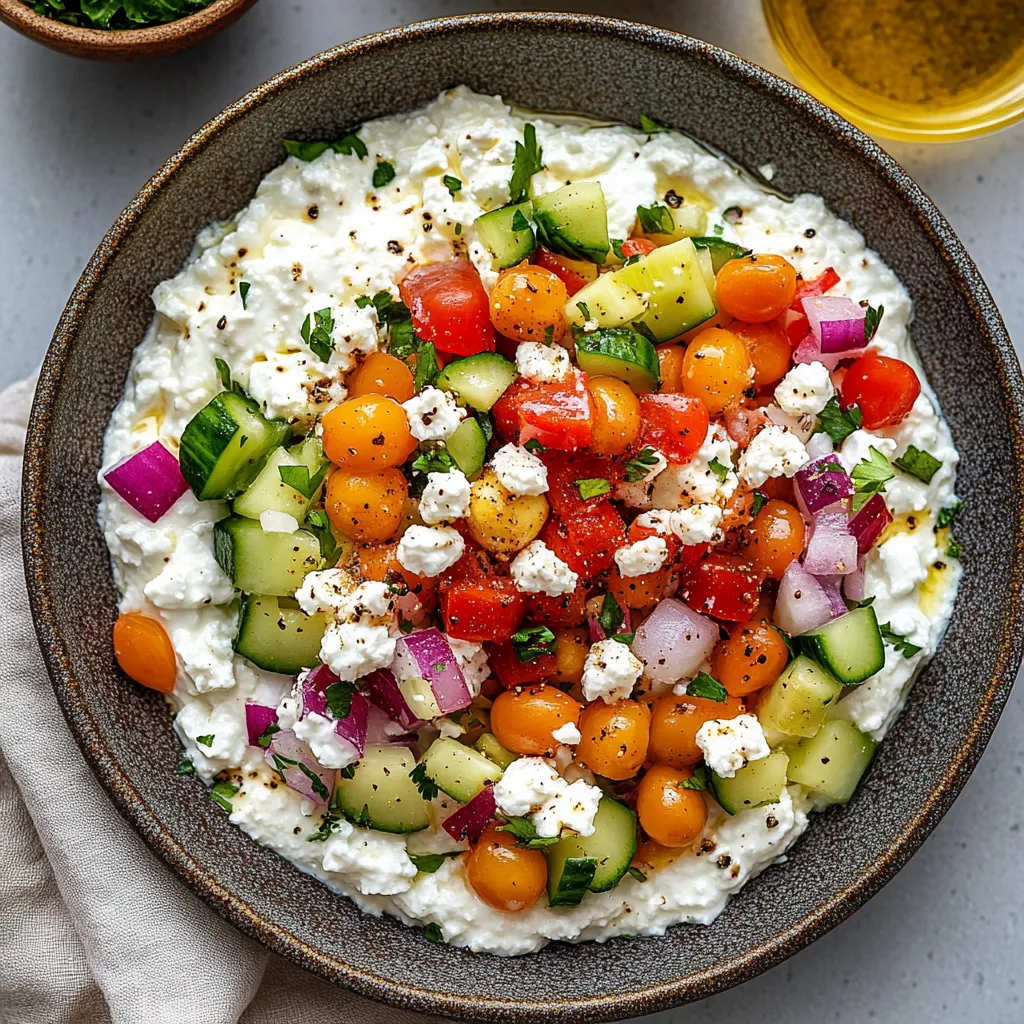 Pin it
Pin it
This Greek cottage cheese salad transforms humble ingredients into a protein-packed Mediterranean feast that takes just minutes to prepare. The creamy cottage cheese creates a perfect canvas for crisp vegetables and tangy olives, making this my go-to lunch when I want something satisfying yet light.
I discovered this recipe during a particularly hot summer when turning on the stove seemed unbearable. What started as a quick lunch solution has become my most requested potluck contribution, with friends always asking for the recipe.
Ingredients
- Cottage cheese: Serves as the protein-packed base that keeps you satisfied for hours
- Cucumber: Adds essential crispness and hydrating properties; choose firm specimens with minimal seeds
- Tomatoes: Provide juicy sweetness and vibrant color; cherry varieties offer concentrated flavor
- Kalamata olives: Deliver that distinctive Mediterranean brininess and depth of flavor
- Feta cheese: Introduces tangy saltiness; select authentic Greek feta for the best experience
- Olive oil: Binds the flavors together and adds richness; use extra virgin for best results
- Dried oregano: Provides the quintessential Greek herb profile; crush between your fingers before adding
- Salt and pepper: Balance all elements; remember feta is already salty so taste before adding more
Step-by-Step Instructions
- Prepare The Base:
- Add cottage cheese to a large bowl, preferably one with ample mixing room. If your cottage cheese seems watery, drain it in a fine mesh strainer for about 10 minutes before using. This creates a creamier base and prevents the salad from becoming soggy.
- Add Fresh Vegetables:
- Dice cucumber into small, uniform pieces about 1/4 inch in size. If using a cucumber with large seeds, consider scooping them out before dicing. For tomatoes, remove excess seeds and juice before chopping to maintain the salad's texture. Cherry tomatoes can be halved or quartered depending on their size.
- Incorporate Mediterranean Elements:
- Gently fold in the Kalamata olives and cubed feta cheese. Distribute them evenly throughout the mixture without breaking down the cottage cheese too much. This ensures every bite contains the perfect balance of flavors.
- Dress The Salad:
- Drizzle olive oil evenly across the surface of the salad. Sprinkle dried oregano, crushing it between your fingers first to release the essential oils. Season lightly with salt and freshly ground black pepper, remembering that both the olives and feta contribute saltiness.
- Final Toss:
- Using a large spoon or spatula, gently fold all ingredients together until just combined. Overmixing can break down the cottage cheese and create a less appealing texture. Aim for ingredients to be evenly distributed while maintaining distinct pieces.
 Pin it
Pin it
The cucumber is my favorite component in this dish. I grow several varieties in my garden each summer, and nothing beats the crisp texture of a just-picked cucumber in this salad. My grandmother taught me that removing the seeds creates a less watery final dish, advice that transformed my results.
Storage Tips
This salad keeps remarkably well in the refrigerator for up to three days in an airtight container. The flavors actually improve after a few hours as ingredients meld together. If making ahead, consider adding tomatoes just before serving to maintain their texture. For best results, give the salad a gentle stir before enjoying leftover portions.
Customization Options
This recipe welcomes personal touches based on what you have available. Add diced red onion for sharpness, bell peppers for sweetness and crunch, or avocado for creamy richness. For herb lovers, fresh dill or mint make wonderful additions. Those seeking extra protein can incorporate chickpeas or grilled chicken. The foundation remains adaptable while maintaining its Mediterranean spirit.
Serving Suggestions
Enjoy this versatile salad in multiple ways. Serve it alongside warm pita bread for a complete lunch, or use it as a protein-rich side dish with grilled meats. In summer months, I often serve it over mixed greens for a more substantial salad. It also makes an unexpected but delightful topping for baked potatoes or can be stuffed into hollowed tomatoes for an impressive appetizer.
 Pin it
Pin it
This salad is a testament to how simple ingredients can create something truly special. Perfect for weekday lunches or summer gatherings, it never disappoints.
Frequently Asked Questions
- → Can I prepare this Greek cottage cheese salad in advance?
While you can prepare the ingredients ahead of time, it's best to assemble this salad just before serving. The cucumber and tomatoes will release moisture over time, which can make the salad watery. If needed, prep the ingredients separately and combine them up to 2 hours before serving.
- → What type of cottage cheese works best for this salad?
Large or small curd cottage cheese both work well. For a creamier texture, use full-fat cottage cheese, but low-fat versions can be substituted if preferred. Some prefer to drain excess liquid from the cottage cheese first for a thicker consistency.
- → Can I substitute ingredients in this Greek salad?
Absolutely! This salad is versatile – try adding diced red onion, bell peppers, or fresh herbs like mint or dill. If you don't have Kalamata olives, any olive variety works. You could also replace feta with another crumbly cheese like goat cheese.
- → How can I make this Greek cottage cheese salad more filling?
To make it heartier, add protein like grilled chicken, shrimp, or chickpeas. You could also incorporate cooked quinoa or orzo pasta. Serving it with warm pita bread or a crusty baguette turns it into a complete meal.
- → What are the nutritional benefits of this Greek salad?
This salad is packed with protein from both cottage cheese and feta. The vegetables provide fiber, vitamins, and minerals, while olive oil adds healthy fats. It's relatively low in carbohydrates, making it suitable for many dietary preferences, including low-carb and high-protein diets.
- → How long does this Greek cottage cheese salad keep in the refrigerator?
This salad is best enjoyed fresh, but leftovers can be refrigerated for up to 24 hours. The texture will change as the vegetables continue to release moisture. If planning for leftovers, consider keeping some components separate until serving time.
